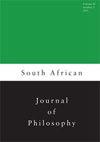非洲形而上学中的死后问题:探讨死亡和生命的意义
IF 0.2
3区 哲学
0 PHILOSOPHY
引用次数: 0
摘要
本文章由计算机程序翻译,如有差异,请以英文原文为准。
The post-death question in African metaphysics: Engaging Attoe on death and life’s meaning
Aribiah Attoe took issue with the materialist and the non-materialist African conceptions of death by arguing that the reality of death puts pressure on the human conception of life’s meaning. He admits the reality of an afterlife experience through a causal principle that sees events in the world as the product of interactions between predetermined past events. It is an afterlife where a decomposing body continues interacting with other things in the world, not an afterlife involving consciousness. While conscious meaning-making ends in the death of the body in Attoe’s materialist view, thereby affirming the conclusion that human existence is meaningless and the universe is purposeless, the conviction about life’s meaninglessness is also reinforced by the possibility of a second death, that is, the death of the transcendent consciousness in the traditional African view. In this article, I will mount two objections to Attoe’s submission. First, I argue that Attoe’s refutation of life’s meaning may be faulted by a world view devoid of the ideas of the afterlife and immortality. Life’s meaninglessness for him should have been limited to the facts of human existence in the world, not the human inability to continue meaning after death. Second, Attoe’s conception of death as finality questions his principle of causality that suggests the reality of an endless afterlife. Attoe’s overarching submission on life’s meaninglessness gives the impression that theories of life’s meaning must be anchored on the thought of an afterlife and immortality.
求助全文
通过发布文献求助,成功后即可免费获取论文全文。
去求助
来源期刊

SOUTH AFRICAN JOURNAL OF PHILOSOPHY
PHILOSOPHY-
CiteScore
1.00
自引率
0.00%
发文量
19
期刊介绍:
The South African Journal of Philosophy (SAJP) is the official publication of the Philosophical Society of South Africa. The aim of the journal is to publish original scholarly contributions in all areas of philosophy at an international standard. Contributions are double-blind peer-reviewed and include articles, discussions of articles previously published, review articles and book reviews. The wide scope of the South African Journal of Philosophy makes it the continent''s central vehicle for the publication of general philosophical work. The journal is accredited with the South African Department of Higher Education and Training.
 求助内容:
求助内容: 应助结果提醒方式:
应助结果提醒方式:


